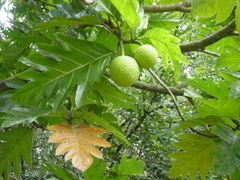|
2. Barthel informs
us that the Maori singers in New Zealand, where the breadfruit did not
grow, 'translated' kuru (= breadfruit) in the old songs - from the
times when their forefathers lived in a warmer climate - into
poporo.
He points out that
in the Marquesas they counted the fruits from the breadfruit trees in
fours, perhaps thereby explaining the four 'berries' in this type of
glyph.
The breadfruit did not grow on Easter Island but the berries of
Solanum nigrum were eaten in times of famine.
Barthel compares with the word koporo on
Mangareva. The poor crop of breadfruits at the end of the harvest season
was called mei-koporo, where mei stood for breadfruit. On
other islands breadfruit was called kuru, except in the Marquesas
which also used the word mei. Koporo was a species of
nightshade.
| "Breadfruit (Artocarpus altilis)
is a tree and fruit native to the Malay Peninsula and
western Pacific islands. It has also been widely planted
in tropical regions elsewhere. It was collected and
distributed by Lieutenant William Bligh as one of the
botanical samples collected by HMS Bounty in the
late 18th century, on a quest for cheap, high-energy
food sources for British slaves in the West Indies ...
According to an
etiological Hawaiian myth, the breadfruit originated
from the sacrifice of the war god Kū. After
deciding to live secretly among mortals as a farmer,
Ku married and had children. He and his family lived
happily until a famine seized their island. When he
could no longer bear to watch his children suffer, Ku
told his wife that he could deliver them from
starvation, but to do so he would have to leave them.
Reluctantly, she agreed, and at her word, Ku
descended into the ground right where he had stood until
only the top of his head was visible. His family waited
around the spot he had last been day and night, watering
it with their tears until suddenly a small green shoot
appeared where Ku had stood. Quickly, the shoot
grew into a tall and leafy tree that was laden with
heavy breadfruits that Ku's family and neighbors
gratefully ate, joyfully saved from starvation ...

(Wikipedia) |
|
